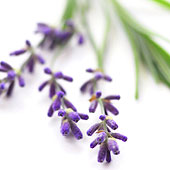Lavender - Natural Health Product
Non-traditional solutions to help boost your health and wellness.
Lavender
General Information
Lavender is native to the Mediterranean region, Africa, Russia, and the Arabian Peninsula. It was used in ancient Egypt as part of the process for mummifying bodies. Lavender’s use as a bath additive originated in Persia, Greece, and Rome. The herb’s name comes from the Latin lavare, which means "to wash."
Common Name(s)
Scientific Name(s)
Lavandula angustifolia

How is this product usually used?
Lavender oil can be taken orally, inhaled, or used on the skin (topically).
When taken by mouth, the recommended dosage is 80 mg to 160 mg daily, for up to 10 weeks. Lavender oil can be inhaled by diluting it with water and diffusing, applying it to the palms, and applying it to your clothes. Lavender oil can also be directly applied to the skin via massage, through a bath, or other methods.
Your health care provider may have recommended using this product in other ways. Contact a health care provider if you have questions.
What is this product used for?
Lavender has traditionally been used in herbal medicine to help with:
- anxiety
- depression
- menstrual pain
- fatigue
- insomnia
Lavender has been shown to be effective in treating anxiety, depression, and menstrual pain. There is insufficient evidence to show that lavender is effective at relieving fatigue or insomnia.
Your health care provider may have recommended this product for other conditions. Contact a health care provider if you have questions.
What else should I be aware of?
Lavender is typically well-tolerated orally. Side effects of taking lavender orally include changes in breath odour, constipation, diarrhea, indigestion, belching, headache, and nausea. When applied on the skin, the common side effect is skin irritation.
Lavender can cause sedation and may increase the effects produced by other sedative medications. Lavender may also increase the effects anesthesia. You should stop using lavender at least 2 weeks before elective surgery.
Consult your doctor if you are pregnant or breast-feeding. Consult your doctor if you are under 18 years of age. Stop using lavender if you develop an allergic reaction.
Before taking any new medications, including natural health products, speak to your physician, pharmacist, or other health care provider. Tell your health care provider about any natural health products you may be taking.
Source(s)
- Lavender. Natural Medicines Comprehensive Database.
All material copyright MediResource Inc. 1996 – 2020. Terms and conditions of use. The contents herein are for informational purposes only. Always seek the advice of your physician or other qualified health provider with any questions you may have regarding a medical condition.


